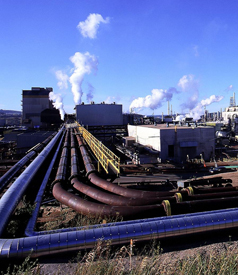In D.C., pipeline safety organization schools Congress on seven measures still needed to minimize potential hazards.
Editor’s Note: In late September, SolveClimate News reporter Elizabeth McGowan traveled to Nebraska to find out more about the Keystone XL pipeline that TransCanada plans to build to carry crude oil from the tar sands of Alberta to Gulf Coast refineries in Texas. This is the fifth in a series. Read Part 1, Part 2, Part 3 and Part 4 here.
Lincoln, Nebraska – Indigenous communities in Canada and the United States are singing the same tune in opposition to TransCanada’s Keystone XL pipeline.
Last week, representatives from Canada’s First Nations traveled to Washington, D.C., to explain how mining of tar sands for heavy crude oil is causing severe health problems and environmental upheaval across their communities. They’ve also joined forces with Native American groups in the U.S., calling on tribal councils along the Keystone XL’s route to come out against the proposed pipeline.
Their concerns are being echoed on Capitol Hill by a pipeline safety organization that recently recommended to a congressional subcommittee specific safety measures to include in any potential pipeline legislation.
Calling All Tribal Councils
To build solidarity between Native Americans in the United States and First Nations in Canada, groups such as the nonprofit Indigenous Environmental Network are fostering cross-boundary bonds. The network already operates anti-tar-sands campaigns out of offices in Ottawa, Ontario and Bemidji, Minn.
Marty Cobenais, a member of the Red Lake Band of the Chippewa and a Minnesota-based organizer with the network, is doing much of the groundwork.
Tribes have varying reasons for rejecting the pipeline, Cobenais said, including that it potentially threatens the enormous Ogallala Aquifer or desecrates sacred lands on traditional homelands.
He estimates there are 15 to 20 tribal councils along the 1,375-mile section that starts in Montana and stretches through South Dakota, Nebraska, Kansas, Oklahoma and Texas.
Help fight ignorance. Click here for free Truthout email updates.
“We want the Canada and U.S. tribes to stand in unity to fight this,” Cobenais said, adding that this is a prime opportunity to stand behind President Obama’s public statements about the need to wean the U.S. from fossil fuels. “We can’t allow a divide-and-conquer mentality to prevail.”
The tribes are rallying with green groups that are calling for pipeline standards to be upgraded and public notification to be expanded. Specifically, they are addressing safety issues, among them pipeline lifecycles, rules for abandonment, waivers for the thickness of steel pipes and maximum pumping pressure.
“When the pipeline can no longer be used, are they going to be removed?” Cobenais asked. “Right now abandoned pipelines are filled with what they call nontoxic chemicals, even though they haven’t disclosed what they are. We want them taken out. Otherwise, you have toxic waste fields crisscrossing America.”
For the most part, their demands are on the same page as the Pipeline Safety Trust, which monitors all types of pipeline issues. Officials from the nonprofit, based in Bellingham, Wash., are regularly called to Capitol Hill to offer testimony at oversight hearings.
Senate Testimony on Pipeline Safety
At a Sept. 28 Senate hearing assessing the San Bruno, Calif., explosion and other recent accidents, Pipeline Safety Trust vice president Rick Kessler laid out for a Commerce, Science and Transportation subcommittee seven specific measures a bill aimed at safety concerns should include to be comprehensive.
A former staffer for the House Energy and Commerce Committee, Kessler suggested requiring automatic shut-off valves for gas pipelines and emergency flow-restricting devices on hazardous liquid pipelines, improving the use of internal inspection devices, or “smart pigs,” and upgrading leak detection capabilities.
He also recommended continuing grant money for communities to hire independent technical advisers, educating local governments on pipeline safety practices and clearly informing local residents where pipelines are located in their communities.
“The question isn’t whether pipelines are a safe mode of transportation compared to other ways to move fuel. The real question is whether they are as safe as they could and should be, and the secondary question is whether they are being regulated in the most efficient, effective and protective manner they could or should be,” Kessler told the senators. “Unfortunately, the answer to both questions is no.”
In addition, Kessler recommended that senators consider five other measures. These included pushing state agencies on damage prevention from pipelines and ensuring the ability of the U.S. Department of Transportation’s Pipeline and Hazardous Materials Safety Administration (PHMSA) to provide adequate inspections when pipelines are being constructed.
“One area where PHMSA could go even further in transparency would be a Web-based system that would allow public access to basic inspection information about specific pipelines,” Kessler said in his testimony. “An inspection transparency system would allow the affected public to review when PHMSA and its state partners inspected particular pipelines, what types of inspections were performed, what was found and how any concerns were rectified.”
Elizabeth McGowan, Washington D.C. correspondent for SolveClimate News, is reporting on climate and energy policy positions of candidates running for office in the 2010 midterm elections.
Join us in defending the truth before it’s too late
The future of independent journalism is uncertain, and the consequences of losing it are too grave to ignore. To ensure Truthout remains safe, strong, and free, we need to raise $43,000 in the next 6 days. Every dollar raised goes directly toward the costs of producing news you can trust.
Please give what you can — because by supporting us with a tax-deductible donation, you’re not just preserving a source of news, you’re helping to safeguard what’s left of our democracy.
